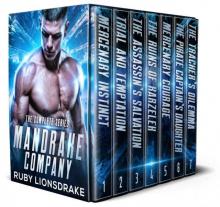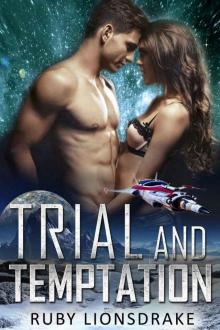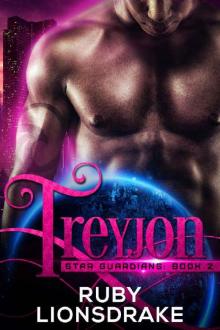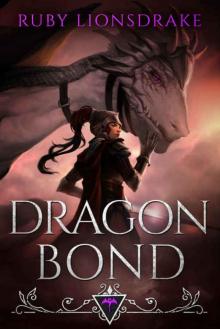- Home
- Ruby Lionsdrake
Frost Station Alpha 1-6: The Complete Series Page 2
Frost Station Alpha 1-6: The Complete Series Read online
Page 2
Tamryn’s fingers felt cold and numb as she swiped them through the displays, trying to find more of the intruders in the corridors of the station. She had to collect intelligence to send off, even though it would take nearly a day for the information to be relayed back to the midway Fleet station, and it would be another three or four days before she could expect reinforcements.
She glimpsed two more brawny figures with tattoos and patched clothing jogging through a corridor before they disappeared from the feed. A few seconds later, one of the other internal cameras was shot out—that time, she didn’t see the culprit.
Tamryn recorded a report to go along with the images, her fingers flying over the holo keyboard faster than she could have spoken the words. While she worked, she grew aware of heavy breathing behind her, just audible over the alarm still wailing in the corridor beyond the door. Sergeant Wu had returned to pacing, but his face was livid, and he clenched his rifle like he might smash it against the wall at any moment. As much as seeing all of the carnage had disturbed Tamryn, Wu had been here a lot longer than she had, grown close to the men now dead on the floor in engineering. It had to be tearing him up that he couldn’t do anything about it.
“We will do something about it,” she said, her words as much for herself as for him.
“What?”
What, indeed. Tamryn eyed the environmental controls. If they knew all of their people were dead, they could remove the oxygen from select sections of the station. The idea of doing that when there might be survivors made her sick to her stomach, but she and every soldier here had sworn an oath to protect GalCon citizens, and she shuddered to think what would happen once those thugs found the scientists.
“If you’re thinking of gassing them or cutting off the air, you’d better do it now,” Wu said. “They would have taken engineering first for a reason. They’ll have access to all of the equipment and main computers down there and can override anything we do. Communications is the only equipment that’s headquartered up here.” He jerked his head toward the ceiling, as if to indicate the various dishes and antennae sending and receiving data from the top of the station.
“I’ll try.”
Tamryn hit the send button for her message, then switched to the environmental controls console. Before she could do more than wave the display to life, all of the lights on the panel winked out. The display followed, leaving empty air behind.
“Damn it.” She jabbed at the controls, even though she already knew what had happened. Exactly what Wu had said. They had overridden her controls.
He sighed. “You have any weapons besides your knives? Because they’re going to come up here eventually. They’ll want to blow up that console.” He pointed at the communications equipment, the only equipment still powered up in the room. “Keep us from sending messages. You have sent messages, right?”
She was about to say yes, but frowned because her report was still sitting in the outbox. “I tried.” She jabbed a couple of buttons and growled. “It’s the storm. I don’t think it’s going to send until the flare dies down.”
“When will that be?”
Tamryn pulled up the system meteorology report for Mysterium. “The prediction is thirty-seven minutes.”
Wu’s expression was bleak. He didn’t voice what they were both thinking, that those intruders would probably find their way up here by then, and that they might be able to delete the message before it went out.
“I’ll try to lock up the console,” Tamryn said, “make it so it only responds to me.”
If possible, Wu’s face grew even bleaker. Maybe he was imagining them torturing her to make her unlock the station. She gritted her teeth. They would have to catch her to do that.
She strode to the locker by the door and pushed past cleaning supplies to pull out her weapons belt. She buckled it on and checked the energy levels in the two pistols that hung from it and in the spare laser cartridges. Full. It also held a dagger, which she kept sharpened to a fine edge. She jammed her throwing knives into sheaths secreted about her body.
Another explosion erupted somewhere on the station, causing the deck to rattle again.
“Got any idea who these people are, Wu?” Tamryn couldn’t help but feel that the experienced sergeant must know more than she. “The way they moved...”
“No,” he said. “Some of them might be androids, but that dress? That’s nobody’s merc team. Pirates, for sure.”
“Androids with tattoos? I haven’t seen any that come out of the factory that way.”
“Could’ve been modified. Branded.”
Tamryn pulled out one more weapon, her Fleet issue anti-armor ballistic rifle with a sniper scope. The explosive rounds were rated to blow holes in combat armor. She looked around Comm and Control, not liking how little room there was to maneuver. There wasn’t anything to hide behind, either, other than the two chairs bolted to the deck.
Wu had probably already assessed the area and guessed her thoughts, for he said, “If they rush in, willing to sacrifice the ones in the lead, they’ll overpower us quickly.”
“Since this is locked down, it might make sense to remove the key.” She waved at the communications console, then flicked her hand at herself. “What if we head to Aux-Comm at the other end of the station? Make it harder for them to find us?”
“We have our orders,” Wu said sturdily.
“And the man who gave them is dead.” Tamryn regretted her bluntness when Wu winced. “Sorry,” she said, “but if we leave a trap and get out of here, it’ll help us buy time, right? That’s all we can do—make sure that message sends and then try to stay alive until reinforcements make it out.”
“We have to keep the scientists alive too. That’s why we’re here.”
They would be lucky to keep themselves alive. “Let’s start with the trap, all right?”
Tamryn poked back into the locker. In addition to her own gear and the cleaning supplies, there were water and food rations, along with a personal forcefield and grenades, all the tools one should need to defend the area indefinitely. She palmed a grenade and held it up so Wu could see.
He’d hesitated to answer, but now he nodded, his decision made. “I’ll do it. We’ll kill as many of those bastards as we can.”
She tossed him the personal forcefield, figuring he would insist on standing in front of her if trouble charged through the door. While Wu rigged the explosives to blow when someone bumped into his tripwire, Tamryn double-checked the communications station, making sure that only the combination of her retina scan and password would allow access. Knowing she might die despite her best intentions, she also ensured Captain Porter and the lead scientist could get in with their passwords too.
By the time she was done, sweat dribbled from her brow. She hadn’t even left the room yet, and her adrenaline-charged body already thought she had been fighting all day.
Wu stood up, waving at his booby trap. The grenades ought to have the power to rip even an android to pieces. That power might also rip the comm station to pieces, but that was what Aux-Comm was for. If all else failed, she had a program on her personal tablet that could tie in with the dish outside.
“That’ll do it,” Wu said. “Let’s go.”
“Forcefield,” she warned.
He thumbed the button on the simple device, creating a convex field of energy ahead of him, translucent except for blue lines that outlined the edges of the barrier. It would make walking without bumping into things difficult for him, but it could take three or four laser blasts before running out of juice.
Wu stepped toward the door, but paused before exiting.
“Do me a favor, LT?” he asked softly.
“Yes. What?”
“In case I don’t make it and you do, let my wife know... just let her know I love her. And that I died doing my duty, will you?”
His expression was nothing but professional and determined, but his request almost brought tears to her eyes. Until that moment, she’d
been walling herself off from the reality that their entire platoon seemed to be dead, but the inevitability of the odds surged over her now. How could he think she would survive when he didn’t? They might keep her long enough to force her to access the comm, but after that? From what she’d seen so far, these people did not appear lenient.
“I will,” she managed to say around a lump in her throat.
“But don’t... if they capture you—and I aim to do my best to make sure they don’t, but if they do—don’t feel you gotta survive just for me though. Some things are worse than dying, and those pirates might—” He shook his head. “Never mind. We’re not going to get captured or killed. Check the sensors and let’s go, LT.”
She closed her eyes, gathering her courage—and also wishing he hadn’t brought any of that up. Now she knew why he thought the pirates might keep her alive, and she hadn’t wanted to know that. No, she wasn’t going to be captured. She was going to survive. They both were.
She glanced at the sensor display beside the door to make sure the corridor was empty, then nodded.
“Ready,” she said, steeling her nerves. Her voice came out calm, confident.
Wu waved at the sensor to open the door.
The pirate from the engineering video stood there.
Chapter 2
Though he was caught off guard, Hunt Leader Makkon Starson fired the instant the door opened. He had expected to have to blow his way into the communications station and had been in the process of pulling out explosives to plant. Still, his reflexes were quicker than those of the soldiers poised on the other side, and he fired first, aiming at the big man in the lead. He took a step at the same time, expecting to bowl over the man and gain access to the room, but his laser fire struck something before hitting the soldier. It splashed off an invisible barrier, the energy deflected in a dozen directions.
Makkon leaped away, almost catching some of the backlash. Before his feet touched the ground, he had identified the blue edge of the unfamiliar barrier, recognizing the shield for what it was. He had never seen such technology, but he could not allow anything here to surprise him. Naturally, progress would have been made in the last hundred and fifty years.
The soldier charged out with a woman right behind him. They both wore black military uniforms and carried weapons.
“Go,” the leader barked, turning himself in the corridor so that he blocked the woman from Makkon’s view. He thrust his rifle through the shield, causing a slight ripple in the translucent barrier, and fired.
Makkon wasn’t faster than a laser, but he was fast enough to see the soldier’s finger tensing on the trigger and to leap out of the way just ahead of the shot. A crimson beam streaked down the corridor, missing his side by an inch. Almost before he’d landed, Makkon was lunging forward. He had the gist of the barrier—it would let the soldiers shoot out while blocking incoming fire—and thought he could disarm the man. Though the soldier tried to fire again, Makkon was too quick. He grabbed the muzzle of the rifle and yanked it away.
It came through the barrier, and the soldier, unbalanced by the powerful pull, stumbled forward too. The shield moved with him, and Makkon had to skitter back to avoid coming into its range. He did not know if he would simply bounce off, or if it could injure him.
With the soldier deprived of his weapon, Makkon backed up a few steps to fire. He had no idea how much damage that barrier could withstand, but he aimed to find out. He thought about trying to clobber it with his ice axe, but he didn’t know the ramifications of being connected to something that touched the shield.
As Makkon fired, the soldier pulled out a laser pistol to replace his missing weapon. Instead of shooting, he backed down the long corridor, going in the same direction that the woman had run. That told Makkon much. The barrier did not go all the way around the man.
Makkon fired again, raining laser fire at it, but he also eyed the walls, calculating angles. Lasers didn’t have the same properties as bullets, but they would bounce off an object that was too dense to melt right away. He charged toward the soldier, knowing he would have to get close to find the right angle.
The man’s eyebrows rose in surprise, but he appeared confident in his shield. He paused and leaned forward to thrust his pistol through it. Makkon dove into a roll, the axe on his back clunking on the deck, an instant before he fired. He heard the screech of the laser beam, even if he could not see it blasting through the air above him. Then he leaped to his feet, no more than two feet from the soldier’s forcefield. He whipped up his rifle, as if to fire straight at it, but then jerked it to the side. He squeezed off two blasts. They struck the wall in succession at infinitesimally different spots and ricocheted. His calculations were correct. The first beam only glanced past the back of the soldier’s thigh, but the second tore into his shoulder, half burning the man’s arm from his body.
His scream of pain tore through the corridor, piercing Makkon’s eardrums like daggers. Makkon grimaced. He’d seen plenty of death in his life, and been responsible for some of it, but he had never claimed to like it. He was fully aware that these soldiers were the descendants of those who had obliterated his home world, not the bastards themselves.
The soldier crumpled to the floor, not dead yet. Good—Makkon expected the communications station would require a passcode or scan.
Before trying to figure out how to extricate the gasping man from the shield, which had fallen atop him, Makkon glanced toward the end of the corridor. He expected the female soldier to be long gone. Instead, she was leaning around the corner of an intersection forty meters away, a rifle pointed in his direction. She fired without hesitation. Makkon dropped to the ground, the injured man and his shield the only cover in the corridor. Her laser almost sizzled through his hair, and he chastised himself for not paying more attention to his senses. If he hadn’t glanced up, he would have been dead, and he would have deserved his fate.
“Recriminate later,” he muttered to himself, leaning around the forcefield to return fire.
Not surprisingly, the female soldier had already ducked back around the corner. Makkon tried to listen over the wailing alarm—oh, how he wished he could find the speakers to blow them up. He had excellent hearing, as everyone on his team did, but he did not detect the sound of footsteps running away. Had it been quieter in the corridor, he might have heard her breathing. Even though he did not, he believed she was still there.
Something flew around the corner. A grenade. Before it had traveled even a few feet, Makkon shot it. It exploded more than thirty meters away. He felt the heat and winced away from the brilliant flash of light, but the shrapnel it flung did not harm him. What few pieces flew all the way down the corridor were blocked by the soldier’s forcefield.
Makkon thought he caught a faint gasp of pain as the roar faded. From the woman? He might have blown up the grenade early enough that some of the shrapnel caught her.
This time, he did hear footsteps. He jumped up, planning to race after her, forcefields or not, but a clang came from the corridor behind him, back in the direction from which he had come. A hatch banging open? He had no way to know if it was friend or foe. After a brief hesitation, he growled and returned his attention to the man at his feet. He couldn’t let the soldiers reclaim this station.
Keeping his back to the wall so nobody could sneak up on him, Makkon considered the fallen man and the faint ring of blue that he believed marked the edge of the forcefield. He found a gap and levered the tip of his rifle under it. It rose a few inches, but he couldn’t fling it aside without the soldier moving. The man groaned when he tried. It was as if the barrier was attached to him by a leash, though nothing was visible. Makkon spotted a compact device on the front of his belt, a single button on it. Lifting the shield with one rifle, he stretched toward it using the rifle he had pulled from the soldier. With a single tap, the forcefield disappeared.
“Handy device,” Makkon murmured, “though it would have been better for you if it had extended a
ll the way around.”
The soldier glared at him and said nothing.
Makkon set the rifles aside and hefted him to his feet. “Can you operate the comm?”
The man, a bronze-skinned veteran with gray threading his black hair, sneered at him. He was full of defiance despite the pain tightening his eyes, and he did not beg for mercy, not like a couple of the men in engineering had.
Makkon nodded, respecting that in the man, but he needed an answer. Salek would have interrogation drugs in his kit, but he was on the other side of the station. Pain and intimidation were the only tools Makkon had available to him.
He grabbed the soldier by the throat, holding him tight enough to get a good grip but not tight enough to crush his windpipe. Fear and pain flushed the man’s face as Makkon lifted him from the deck. The soldier was almost as tall as he was, but that did not matter. Makkon adjusted his stance, giving him the leverage to raise his foe high enough that his toes dangled inches above the deck.
“Can you operate the comm?” Makkon asked again, speaking slowly, enunciating each word clearly so the man could not possibly misunderstand.
“Who are you?” the soldier gritted out, the hand around his neck half-strangling the words. He wasn’t looking Makkon in the eyes. His gaze was fixed on Makkon’s bare forearm, or perhaps on the gash there. Makkon had received it during the fighting in engineering, and a few drops of blood still trickled from it. “Not an android.”
“Nor a cyborg,” Makkon said. “Another guess?”
Makkon could have laughed at the notion that these people truly had no idea where he and his team had come from when they were orbiting and studying his moon, but there was no time. That woman had gotten away, and other soldiers could still be loose on the station too. His team had come into this with poor intelligence, but he knew there were dozens of scientists here in addition to the soldiers, any one of whom might come up with a clever plan to thwart his people if they were given time. This takeover had to be swift and absolute.
“No,” the soldier wheezed.

 Mandrake Company- The Complete Series
Mandrake Company- The Complete Series Mercenary Instinct (a science fiction romance)
Mercenary Instinct (a science fiction romance) Trial and Temptation (Mandrake Company)
Trial and Temptation (Mandrake Company) Zakota
Zakota Orion: Star Guardians, Book 1
Orion: Star Guardians, Book 1 Zakota: Star Guardians, Book 5
Zakota: Star Guardians, Book 5 Unchained_ A science fiction romance adventure
Unchained_ A science fiction romance adventure Hierax: Star Guardians, Book 4
Hierax: Star Guardians, Book 4 Frost Station Alpha 1-6: The Complete Series
Frost Station Alpha 1-6: The Complete Series Treyjon: Star Guardians, Book 2
Treyjon: Star Guardians, Book 2 Sagitta: Star Guardians, Book 3
Sagitta: Star Guardians, Book 3 Ariston_Star Guardians
Ariston_Star Guardians The Assassin's Salvation (Mandrake Company)
The Assassin's Salvation (Mandrake Company) Dragon Bond
Dragon Bond